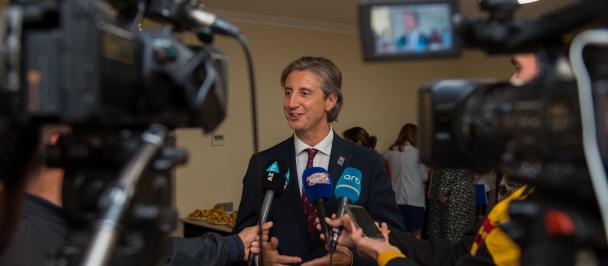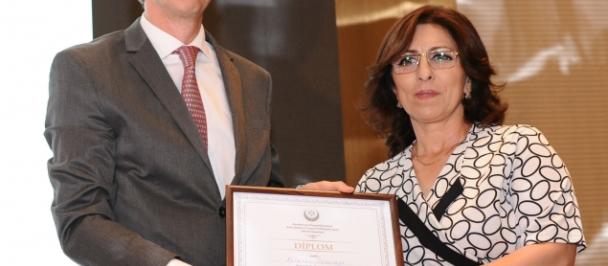As prepared for delivery
Dear CCIAF organizers, partners and colleagues,
Thank you all for convening this important conference on rebuilding micro, small and medium-sized enterprises in the midst of the Covid-19 pandemic.
I am also speaking from home where I am leading the UNDP Azerbaijan team who has been teleworking since mid-March.
This conference could not have been more timely given the impact of the pandemic on our societies and economic.
Let me start with a couple of remarks on the global situation.
The pandemic has plunged the world into recession, destroying the livelihoods of millions of people and jeopardising the futures of millions more.
Unemployment is skyrocketing, with many temporary business closures likely to become permanent.
The International Labour Organisation predicts that some 305 million jobs may be lost as a result of the crisis. In developing countries, income losses are expected to exceed $220 billion.
With an estimated 55% of the global population having no access to social protection these losses will reverberate across societies impacting education, human rights and in the most severe cases food security and nutrition.
Amongst those suffering the worst economic impacts are migrant workers, daily wage-earners and the self-employed. Without alternative sources of income, many millions of workers and their families face imminent disaster.
It is essential, therefore, that any economic stimulus packages to recover from this crisis include effective measures to support income and employment. Without such support, billions of people across the globe will suffer years of hardship before employment and output return to pre-crisis levels.
As it is often the case, it is the poorest and vulnerable who suffer the worst impacts of the pandemic – not only from job losses but from the virus itself and the many knock-on effects of overwhelmed healthcare systems.
This is a systemic global human development crisis – one that is exacerbating already harsh inequalities both within and between countries.
The impacts of the pandemic have already reversed many hard-won development gains.
The latest UNDP Human Development Index shows that countries throughout the world are regressing for the first time in the 30-year history of the Index.
The crisis is unfolding against a backdrop of already-strained global trade, stagnating foreign aid budgets, tumbling commodity prices, protracted conflicts and constrained fiscal space in developing countries.
Micro, Small and Medium Enterprises have been disproportionately affected by the pandemic, as their financial reserves simply don’t stretch as far as big business and multinational corporations.
The critical role of MSMEs cannot be underestimated. They represent 90 percent of businesses worldwide and account for more than 50 percent of global employment. In emerging economies they contribute up to 40 percent of GDP, and this is expected to grow over the coming years.
Yet despite their overall contribution to the global economy, MSMEs are often fragile. They find it difficult to access financial services and are much less likely to be given loans than large organizations.
Approximately 65 million formal MSMEs are credit-constrained, while the total unmet demand for credit in developing economies is estimated to be around US$5.2 trillion.
This puts small businesses at increased risk of economic shocks, with more than 436 million enterprises in the hardest-hit sectors worldwide facing serious disruption at best.
There is a huge demand across developed and developing countries to help stave off the crisis by slashing interest rates, injecting liquidity, and providing emergency funding for MSMEs and households.
But beyond the initial need of support through cash transfer, subsidies and liquidity, we must also think of putting in place the necessary infrastructure to ensure small businesses are more resilient to future disasters and pandemics.
This unprecedented crisis presents us with an unprecedented opportunity to build back better – a chance to invest in a more equal, inclusive, green and sustainable future.
Getting through Covid-19 and recovering better and greener will require money. But the costs of not taking this opportunity would be much greater – and these costs would not only be financial.
Joint policies and actions are needed to mitigate the socio-economic impacts of the pandemic and build resilience. These policies must aim to empower individuals, communities and societies to emerge from this crisis better able to cope with future global shocks.
As the UN’s lead agency on socio-economic recovery, UNDP is now conducting socio-economic assessments in over 120 countries to ensure that national plans in response to the pandemic take into account the needs of the most vulnerable.
In Azerbaijan, this assessment is ongoing with sector assessments being prepared in a number of key areas of the economy in consultation with the government. The study will result in a costed recovery plan that will try to estimated needs in the short-medium and long term for the recovery.
We have seen the Government making timely efforts to contain and address the immediate challenges of the pandemic and spearheading an effective response by increasing social benefits for vulnerable groups.
UNDP has been working closely with the Government of Azerbaijan to address these challenges from the very beginning.
In particular, we have been helping to ensure that responses take into account the needs of the most vulnerable.
We have been cooperating (with the Government) on a number of key sectors, including employment, healthcare and education.
As an example, we are supporting our longstanding partner the Ministry of Labour and Social Protection of the Population to assess the impacts of the pandemic on the labour and employment market.
At the same time, we have been providing assistance to the Ministry to ensure the successful implementation of the self-employment programme by moving all training to online platforms and enabling up to 500 people with disabilities to start their own businesses and become financially independent.
We also support the Ministry to adapt and fully digitalize the implementation process for the self-employment programme. This process involves mapping, testing, selecting candidates, training and business mentoring. Implementation is now underway, and if it proves successful the Government intends to introduce this model nation-wide.
We have also been working with several Women’s Resource Centres in partnership with the State Committee on Family, Women and Children across Azerbaijan to switch to online business development training. We have supported over 200 women with online training and helped organise the delivery of the equipment to 45 participants to start their own business. Over 800 women received online support of the psychologist during the pandemic period. 340 women were provided with a-month worth food package. Over 400 women participated at training on risk management and risk analysis, online sales and marketing, support to registering for social support provided by the government, tax payments and tax reporting.
Together with the European Union we haves supported family micro- businesses among vulnerable communities such as women and IDPs.
As part of our joint project with the EU and ABAD Public Legal entity to support small businesses in rural areas, we have helped 44 families to establish their business and provided assistance throughout the pandemic. For example, we helped to support a local family business producing cheese. The business has managed to create additional jobs in the local community and their products will be soon available in all supermarkets throughout the country.
As part of our joint project with EU to promote gender sensitive SDGs implementation during COVID-19 - 43 women received in kind seed capital and started their businesses; 603 women received legal aid and psychological support.
Digital transformation has been accelerated during the pandemic and represents an opportunity for MSMEs. Together with the Ministry of Transport, Communications and High Technologies, we designed and launched Evdeqal (Stay at home) the country’s first digital platform that maps all e-services currently available, including links to e-education, e-health, e-entertainment and e-delivery. This platform has the potential to grow into a full-fledged e-business platform. We are now working with the Ministry to start a series of webinars to guide SMEs into moving their businesses to digital.
We are also supporting the Ministry to strengthen the internet availability and signal to the most remote regions in the country with a view to help bridge the digital divide.
There is much more that is being done and needs to be done to support MSMEs and the most vulnerable from the impact of the pandemic.
It relies on cooperation and partnership to ensure no one is left behind.
Thank you for your attention.

 Locations
Locations


